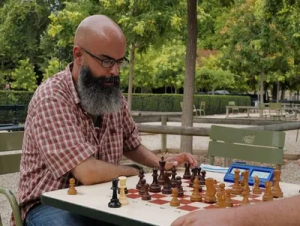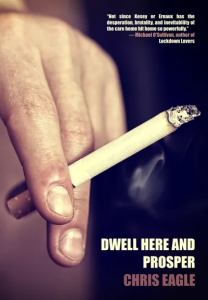

Dwell Here and Prosper by Chris Eagle
Review by Samantha Neugebauer
At eighteen, while a first-year student at Villanova, Chris Eagle became the primary caregiver for his father, Dick Eagle, after he suffered a stroke in his Delco home. Permanently disabled, Dick tried a “ludicrous version of independent living” before accepting that he needed to enter an assisted living facility. Last spring – nearly twenty years later – Tortoise Books published Dwell Here and Prosper, Chris’s debut novel inspired by the many diaries his late father kept during that multi-year period.
In terms of point of view, Dwell Here and Prosper diverge in two important ways from recent autofiction titles. First, the author himself is not the novel’s main character or narrator; it’s Chris writing in Dick’s voice. Secondly, as Chris explains it in the novel’s introduction, narrator, Dick, is not exactly his father:
“My narrator Dick is not Dick Eagle in any simplistic or straightforward sense. Pieces of Dick’s backstory come from other residents. Dad crossed with three or four or five guys I met walking the halls of his building, sitting outside in the yard with him. Dick is a common type of man you meet in assisted livings…”
Still, the novel begins with both the aforementioned introduction (by Chris) and a preface (by Dick), situating the story in a sort of memoiristic haze. Nevertheless, once chapter one gets rolling, the most absorbing features of social realistic fiction are in full swing. Dick is wiry and honest, with a dark sense of humor about the absurdities and negligence that goes on in the various dysfunctional facilities he stays at. He’s also extremely observant making his world and its characters come to life through the tiniest bodily details and habitual mannerisms: nurses with “their purses swinging from their chubby elbows,” a flight of pigeons who “divebomb straight to any spot where the sense food’s been dropped,” and a night nurse “whose complexion is seal-gray and strangely moist as if he rubs petroleum jelly on his face when no one’s looking.” At times, Dick can be comical and hopeful about his condition. The novel begins by Dick telling us that he is working toward getting out of the assisted living, and yet, poignantly, he also admits later:
“In lieu of sheep, lately, I’ve gotten in this unwise habit of counting all the two-handed activities I’ll likely never do again: tie my shoelaces, putt, butter bread, drive a car, cut a steak, fondle two tits at the same time. The stroke struck two years ago last Friday. Arm’s a worse conundrum than the leg. I’ve tried a thousand times, but I can’t figure out how I could manage on my own with only the one functioning hand.”
Throughout the book, readers may wonder why Dick’s fellow residents stay at these facilities, especially those who are on the younger side and seem healthy enough. Dick wonders this too, and his curiosity leads him to many discoveries about the complexities of human nature and mental illness. In one case, after a period of quasi-investigative journalism, Dick befriends “The Thinker,” a forty-two-year-old former professor and Penn graduate who stands out from the other residents because he always has his nose in a book. The Thinker’s room is full of stacks of books and also, oddly, a one-armed mannequin from Wannamaker’s dumpster.
The Thinker also keeps notebooks with extensive (“walls of tiny words”) – “Amphitryon: harassing both sides (Greek)…Umbrageous: offering shade, easily offended…,” which Dick tries to make sense of. Finally, Dick asks The Thinker why he stays, and The Thinker explains that the situation “buys him twenty-thirty years…of reading. Writing.” On the one hand, it’s a fascinating assertion because the professor is right: assisted living is a situation that gives him nearly infinite time to do what he loves most.
Like other institution-based stories, such as One Flew Over the Cuckoo’s Nest and Girl, Interrupted, Dwell Here and Prosper has plenty of quotidian descriptions of the nuts and bolts of assisted living life from the cuisine to medicine distribution to the ways in which residents barter and bride for extra cigarettes. Cigarettes are a ubiquitous feature of Eagle’s novel, in ways comparable to how the cigarette was its own kind of character and cultural signifier in Mad Men. In the preface, Dick mentions that he and his son had considered naming the book Butt. In truth, the power and presence of the cigarette in the novel says as much about the residents of the facility as it does about the novel’s mid-nineties setting. While there are many other markers of the time period, such as certain expressions and ways of talking and the triumphs and losses of local Philly sports teams, the omnipresence of the cigarette adds authentic sensory fabric to Dick’s accounts of the last century. The cigarette was already on its way out and becoming less socially acceptable by the mid-nineties, yet it wasn’t completely gone from mainstream society either. Nevertheless, smoking was– and still is–most prevalent among those on society’s margins, like the misfits, outcasts, poor, and ill who populate Dwell Here and Prosper. Some residents smoke through their weekly cigarette allotment right away, while others, like The Thinker, show “discipline” by allowing himself only three cigarettes a day. In depicting each resident’s personal relationship with the cigarette, we learn something about each resident’s relationship with time itself, too.
Reading this book, I was reminded of essayist Freddie deBoer’s observation that “we’ve built a society where there are more ways to be a loser than a winner.” ‘Loser’ is a harsh word but a fitting one to describe the way most of society views the residents of Dick’s assisted living facility. Although Dick makes the most of his situation, in no way is the assisted living facility existence one to envy. In fact, Dick’s mind is saved partially because he finds a purpose in writing and recording the details of his experience. While this is admirable, it also speaks to deBoer’s point because part of his argument is that “the arts” are one of the other ways not to be a “loser.” Everyone in the facility can’t be like Dick, or even if they could, they might not have the talent or temperament for it.
An assisted living facility is a specific kind of purgatory; by definition, it’s a place for people who require full-time help but not enough to be in a nursing home. In his novel, Chris Eagle is both honoring his father’s memory and throwing light on the state of these facilities, which share characteristics with our psychiatric hospitals, but are not exactly the same. Without being didactic, it’s clear the author believes that these residents deserve more options for happiness and inclusion in society. These days, Chris Eagle lives in Atlanta, where he is a professor of Health Humanities at Emory University. It’s easy to imagine how the experience with his father might have inspired his academic – as well as his creative – interests. Lucky for us, Eagle is also working on a collection of short stories set in Delco.
Chris Eagle is the author of Dwell Here and Prosper (Tortoise Books, 2023), a novel based on the diary his father kept while recovering from a stroke in a highly dysfunctional assisted living facility in southeastern Pennsylvania. His short stories have also appeared in AGNI, Louisiana Literature, and Sortes. Originally from Delco PA, Chris has lived in Berkeley, Paris, Antwerp, Pasadena, Sydney, Berlin, Chicago, and Atlanta. He now lives back in Delco, where he is currently at work on a short story collection set in his hometown.Chris Eagle received his Ph.D. in English Literature from UC Berkeley in 2009. He taught at Caltech, Western Sydney University, DePaul University, Loyola Chicago, and Emory University before retiring from academia in 2024. He is a former Fulbright scholar, Chateaubriand scholar, and Mellon fellow. His areas of research include Health Humanities, Disability Studies, Bioethics, Trauma Studies, and the field of Dysfluency Studies which he helped to found with his monograph Dysfluencies and his edited collection Talking Normal.
Reviewer: Raised in Northeast Philadelphia, Samantha Neugebauer now lives in Washington, D.C., where she is a research assistant at Georgetown University and Georgetown University in Qatar. Previously, she taught at Johns Hopkins and NYU in Abu Dhabi. Learn more about Samantha at her website: samanthaneugebauer.com.